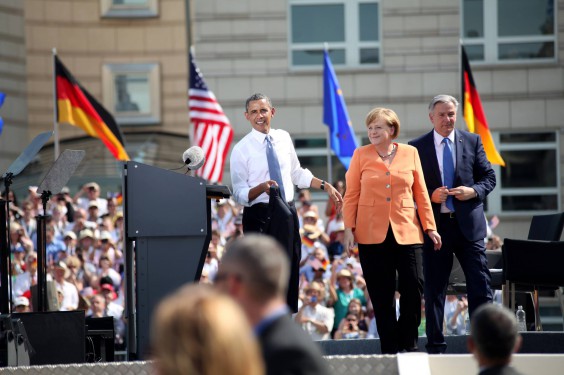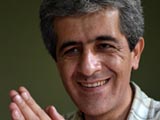Apricot Diplomacy
by Yaghoub Yadali translated by Parvaneh Torkamani / October 8, 2015 / No comments

President Obama and Chancellor Merkel in Berlin, 2013. Photo via Wikimedia Commons.
The “apricot” Humans of New York story that drew Barack Obama’s attention is a fitting metaphor for the refugee crisis in Europe.
The Apricot is very, very important. I am completely serious. A little while ago, I read the story of a boy who lives in Tabriz, a city located in Northwest Iran. As the story goes, a father bought two pounds of apricots for his son and then they walked home together. The son walked behind his father, and gave away the apricots one by one to passersby. When they get home, the father found out that his son gave away all the apricots and there was nothing left for them. Brandon Stanton, the American photographer and founder of Humans of New York, took a photo of this father and son and published their story. Acting very uncharacteristically for an American president, Barack Obama commented on the photo from the official White House Facebook account. He wrote:

- “Enemy…terrorism…nuclear bomb…war.” These words are often used by American media to describe Iran. The image the media presents is often hazy, incomplete, and distorted. The political and military aspects of my country are covered mainly in a negative light.
- In Under Eastern Eyes (I have adopted the name from the novel Under Western Eyes by Joseph Conrad), I will write about those topics which American media either cannot or does not want to talk about. The emphasis will be on social and cultural aspects of Iran although, out of necessity, I will talk about politics, despite my despair.

- Yaghoub Yadali, born in 1970, is a writer and television director. His first work of fiction, the short-story collection Sketches in the Garden, was published in 1997. It was followed in 2001 by Probability of Merriment and Mooning, which was named book of the year by the Writers and Critics Award. His first novel, The Rituals of Restlessness, won the 2004 Golshiri Foundation Award for the best novel of the year and was named as one of the ten best novels of the decade by the Press Critics Award. He has also published many articles and reviews of literature and cinema in newspapers and magazines in Iran.
“What an inspirational story. One of the most fulfilling things that can happen to you as a parent is to see the values you’ve worked to instill in your kids start to manifest themselves in their actions — and this one really resonated with me. I hope this young man never loses his desire to help others. And I’m going to continue doing whatever I can to make this world a place where he and every young person like him can live up to their full potential. (And if I ever get to meet him, I hope he’ll save me an apricot!)”
This story really affected me, and made me start to think about the apricot. As I was thinking, I realized I was drowning in apricots. I told myself, “Be logical, man. Encounter the apricot as if it is only a fruit, not a symbol of our humanity. The apricot is not even important enough to be a symbol of diplomacy. An apricot is an apricot; a yellow and fleshy fruit that comes at the beginning of summer, and many eat its seeds. That is it! Really.”
But is that it? With a flood of war causing Syrian, Iraqi, and other refugees to run to Europe, and the European Union deciding to accept 120,000 of them, would there be 120,000 apricots to give these refugees? Not really. How can you give away apricots if you don’t have any apricots? At first I didn’t believe the European countries that claimed they don’t have any apricots for refugees: Hungary, Poland, the Czech Republic, and so on. So, I went to Google and found out with surprise that the major producers of apricots in the world are Turkey, Iran, Uzbekistan, Algeria, Pakistan, Morocco, and Egypt, with only a few apricots produced in Italy, France, and Spain. I felt embarrassed, and realized some of these European countries are telling the truth when they say they don’t have apricots.
Then I read that that Angela Merkel wants to take one million refugees this year, even though Germany’s name is not on the list of major producers of apricot. Truthfully, I am in love with Angela Merkel and I am sure that she is in love with apricots. It would be nothing for her to call to import two million apricots from Turkey, Iran, Uzbekistan, and Algeria, to distribute one million apricots among the refugees — one apricot each — and one million for the Germans themselves. You know, you cannot give someone an apricot and not have one for yourself: one for you, one for the other. With this logic, I can understand why some of the European countries cannot give apricots to anyone, even if that person has lost his home and family to war.
What I do know is that diplomats who love apricots, like Barack Obama and Angela Merkel, are rare in our times. But I think, in extraordinary circumstances, it is possible for us to follow the example of Christ and give our one apricot to another in need. How many of us would really do otherwise?




